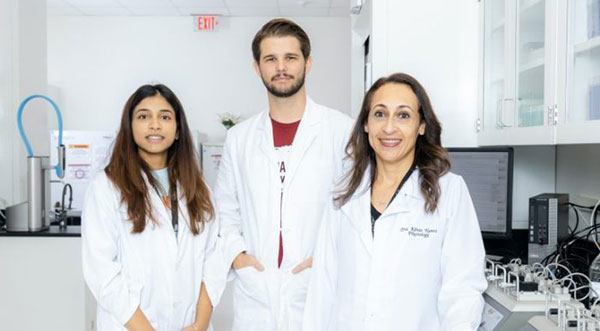Florida Tech Receives $474,177 Grant from National Institutes of Health to Study Diabetes Complications
By Ryan Randall, Florida Tech // December 17, 2022
team will research new mechanisms that lead to vascular problems with diabetes

BREVARD COUNTY • MELBOURNE, FLORIDA – A near-half million-dollar grant from the National Institutes of Health (NIH) will be used to study vascular problems during diabetes.
Kenia Pedrosa Nunes, a researcher at Florida Tech’s vascular biology lab and associate professor of vascular biology, received the $474,177 grant to further study the vascular complications of diabetes.
Continuing previous research on diabetes and other diseases and how the arteries are affected, the team will research new mechanisms that lead to vascular problems associated with diabetes and identify targets to mitigate the disease.
This specific research started two years ago, when Nunes published a paper showing a new role for the heat shock protein 70 (HSP70). The manuscript reported that this protein has a very important role in blood vessels, a discovery for researchers.
While it was known the protein is in many organs, including the pancreas where it plays a role in glucose metabolism, HSP70 had not been studied in the vessel’s contraction yet.
The discovery was made by accident. In addition to HSP70, Nunes was studying a receptor named toll-like receptor 4 that can be activated by HSP70.
When discussing the research data with her student, Amanda Almeida de Oliveira, they realized HSP70 could affect the vessels’ independent of the toll-like receptor.
“So, this receptor is there on the membrane and it needed to be activated by something,” Nunes said.
“Then the activation triggers pathways inside the cell. I started to research HSP70 because Amanda asked me, ‘What’s going to be the molecule touching this receptor in my project?’ I remembered that I had attended a seminar talking about diabetes, and I saw this protein during the presentation. I did some research and saw that this protein could link to the receptor I was investigating. But the goal was to study the receptor. And as we go through the experiments, we realized that the protein was not just linking to the receptor, it was doing much more than that.”
This protein can be found inside of cells, in the bloodstream, or inside the smooth muscle of the arteries. “If you are healthy, low levels of this protein are in your bloodstream. But diabetic patients have high levels in the bloodstream and low levels inside the cells in the arteries,” Nunes said.
“Then, when you get sick, modification of this protein’s levels intensifies an inflammatory process, and a big activation of the immune system, contributing to vascular problems. My research is focused on the contribution of this protein inside the vessels in this context.”
Though Nunes and others are familiar with this protein, they did not know that it was playing a role in the vessel’s contraction. “So, it’s new. The novelty in the grant awarded is to investigate how this protein affects vascular contraction during diabetes,” she said.
“It might be a target to treat vascular problems in diabetic patients. It’s very nice when you find something that’s completely new. It’s very rewarding, but also, it’s a box of surprises because I am still investigating the mechanism. We will see, but it’s exciting because it’s an old friend with a new function.”
To investigate the role of this protein in the vessels at the macro, micro, and nanoscale, Nunes will use state-of-the-art technology such as atomic force microscopy and a new generation ultrasound in Florida Tech’s new Gordon L.
Nelson Health Sciences building. Both undergraduate and graduate students are participating in this project.
CLICK HERE FOR BREVARD COUNTY NEWS














